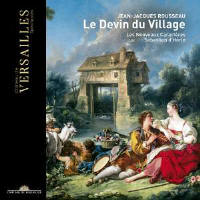Texte paru dans: / Appeared in: |
|
|
Outil de traduction (Très approximatif) |
|
|
Reviewer: Richard Lawrence Hard on the heels of the boy Mozart’s parody, Bastien und Bastienne (Signum,A/18), comes the original. The Village Soothsayer was first staged at Fontainebleau in October 1752; the lovers were sung by Marie Fel and Pierre de Jélyotte, both of them renowned for their association with the operas of Rameau. Rousseau’s little piece was revived at the Opéra a few months later, and it was regularly performed in Paris till well into the 19th century. In 1780 Marie Antoinette took the role of Colette in her new theatre in the Trianon at Versailles, and it’s from that very theatre – not to be confused with the Opéra Royal – that this recording comes. It might seem perverse for Rousseau to have composed an opera in French, given his forcefully held opinion that the French language was not suitable for opera. But Le devin du village is more like an intermezzo, in the vein of Pergolesi’s La serva padrona (1733): with one exception the recitatives are secco, and the arias are simple, even artless. The story is simple, too. Colin, a shepherd, has left Colette, a shepherdess, for the lady of the manor. The Soothsayer (in return for cash down, let it be said) advises Colette to pretend that she, too, has a new lover. Colin returns to heel and all is well. Their reconciliation is achieved at the halfway mark: there is then 30 minutes of rejoicing. Given the amount of dancing, it’s odd for this to be billed as a CD, with the DVD as a bonus; especially as there’s a ‘Pantomime’, unexplained in the booklet, where a courtier, having tempted a village girl and threatened to kill her lover, in the end does the decent thing by yielding her up. The production by Jean-Jacques Schaettel, filmed by Olivier Simonnet, is straightforward. The 18th-century sets include a wooded landscape, an interior, and descending clouds. Colette wears a rust-coloured cloak and a floral dress, Colin is in coat and breeches, while the Soothsayer sports a turban with magnificent plumes. The singers are hardly taxed by the music but they sing mellifluously and act with conviction; the 12-strong band under Sébastien d’Hérin is grace itself. The DVD isn’t divided into chapters and there are no subtitles, but the booklet includes the libretto and English translation. It’s all very enjoyable; but the servants in 1780, witnessing the queen pretending to be a shepherdess, must have thought that the Revolution couldn’t come too soon. |
|




